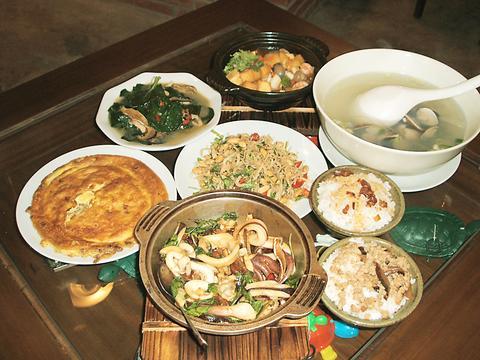After Huang Tsai-yi (黃采誼) moved to Taipei from Ilan County, she realized many Taipei residents missed their rural homes just as she did. So, three months ago she opened Feng lang a gou Xiong (風浪阿狗兄) to bring country food and grass-roots atmosphere to the capital.
Huang lived with her grandmother from age three to 13 and her life inspired the restaurant's name, food, and atmosphere. The name combines old-fashioned Taiwanese slang for "a worldly guy" and "a charming stud." These phrases reminded Huang of those years when she learned to cook in her grandmother's kitchen in Ilan.

PHOTO COURTESY OF FLAGX
Huang's kitchen in Taipei offers over 100 traditional dishes, but each selection has a twist to distinguish it from other Taipei venues that serve up home-cooked, country-style food.
The menu is divided into 15 sections: chef's choice, cold dishes, hot pot selections, meat favorites, seafood, three cups, iron skillet, barbecue, dishes cooked in clay pots, crunchy fried food, noodles and rice, soups, vegetables, healthy pot meals, and set meals.
I brought two friends -- one from Kaohsiung, one from Pingtung -- to help me assess the place. They were delighted right away. Fish tanks on the porch promised fresh seafood. Inside, the walls were covered with paraphernalia from the 1950s through to the 1970s. Most of the items used to belong to Huang's grandmother: a giant Hey-Song poster, movie posters, advertising posters, shelves of plastic toys, trinkets and photographs.
After an appetizer of peppered green beans I tucked into my rice doused in pork oil. More common a generation ago, the rice was so tasty I would have been satisfied with just this.
The vegetable dish of the day was chuan-qi (川七) with mushrooms and ginger. It complemented the omelet, cai pu dan (菜誧蛋) and provided a refreshing contrast with the strong basil of the squid dish (san bei zhong juan, (三杯中卷)). My friends poured the black juice of the squid dish onto their rice. The taste of basil was muted by the three cups sauce. Traditionally, three cups dishes are cooked with liquid ingredients in different pots to vary heat exposure.
The seafood and tofu clay pot (海鮮豆腐) was delicious. A sweet sauce that tasted like shrimp and corn covered lightly fried tofu, baby corn, shrimp, oysters, and carrots. The clay pot conducted heat to keep the flavors rising after the meal had been served.
My favorite dish, however, was tofu cooked on an iron skillet with green peppers, onions and black pepper (鐵板豆腐). Old hit songs entertained my friends as we finish our meal with a clam soup (蛤蠣湯) generously filled with clams and ginger.
The place works as showcase of historical Taiwan pop culture and as a kitchen with some of the best rural cuisine Taipei has to offer.

June 9 to June 15 A photo of two men riding trendy high-wheel Penny-Farthing bicycles past a Qing Dynasty gate aptly captures the essence of Taipei in 1897 — a newly colonized city on the cusp of great change. The Japanese began making significant modifications to the cityscape in 1899, tearing down Qing-era structures, widening boulevards and installing Western-style infrastructure and buildings. The photographer, Minosuke Imamura, only spent a year in Taiwan as a cartographer for the governor-general’s office, but he left behind a treasure trove of 130 images showing life at the onset of Japanese rule, spanning July 1897 to

One of the most important gripes that Taiwanese have about the Democratic Progressive Party (DPP) is that it has failed to deliver concretely on higher wages, housing prices and other bread-and-butter issues. The parallel complaint is that the DPP cares only about glamor issues, such as removing markers of Chinese Nationalist Party (KMT) colonialism by renaming them, or what the KMT codes as “de-Sinification.” Once again, as a critical election looms, the DPP is presenting evidence for that charge. The KMT was quick to jump on the recent proposal of the Ministry of the Interior (MOI) to rename roads that symbolize

In an interview posted online by United Daily News (UDN) on May 26, current Chinese Nationalist Party (KMT) Chairman Eric Chu (朱立倫) was asked about Taichung Mayor Lu Shiow-yen (盧秀燕) replacing him as party chair. Though not yet officially running, by the customs of Taiwan politics, Lu has been signalling she is both running for party chair and to be the party’s 2028 presidential candidate. She told an international media outlet that she was considering a run. She also gave a speech in Keelung on national priorities and foreign affairs. For details, see the May 23 edition of this column,

On the evening of June 1, Control Yuan Secretary-General Lee Chun-yi (李俊俋) apologized and resigned in disgrace. His crime was instructing his driver to use a Control Yuan vehicle to transport his dog to a pet grooming salon. The Control Yuan is the government branch that investigates, audits and impeaches government officials for, among other things, misuse of government funds, so his misuse of a government vehicle was highly inappropriate. If this story were told to anyone living in the golden era of swaggering gangsters, flashy nouveau riche businessmen, and corrupt “black gold” politics of the 1980s and 1990s, they would have laughed.